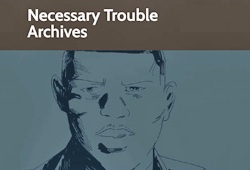
In July 2017, civil rights icon John Lewis led a march of approximately one thousand people through the San Diego Convention Center. According to The Hollywood Reporter, the sojourn occurred directly after Lewis’ panel at San Diego Comic-Con on his graphic memoir trilogy March, during which he told those in attendance, “Dr. King inspired me to get in trouble – what I call good trouble, necessary trouble. Now more than ever before, we all need to get in trouble. When you see something that is not right, not fair, not just, you have a moral obligation, a mission and a mandate to stand up, to speak up, to speak out and get in trouble.”
For school counselor Mick Rabin, those words hit home. “I’m a product of San Diego Unified and public schools,” he said eight years later at another San Diego Comic-Con panel, “Real-Life Superpowers: Teaching Justice, Empathy, and Courage Through Comics.” “The generations that preceded me and the ones that are coming after me and my family are all products of public school. And part of the promise of public school as a pillar of democracy is that it provides our youth the possibility of making change. Cognitive skills. They’re thinking about how they can be involved. Civic engagement.”
Inspired by the words of John Lewis – as well as his convictions regarding public education – Rabin created Necessary Trouble Archives, a collection of curriculums centered on historical graphic novels that include primary source video interviews and a call to action for students to embrace their own forms of “necessary trouble” in difficult and trying times.
“As Ghandi would say, ‘Be the change you wish to see in this world,’” Mick Rabin explained in July 2025. “Well, the people that I’ve been trying to focus on and curate these materials for, these are people who have spent their entire lives devoted to uplifting their communities. About making the world a better place. About leveling the playing field and bringing justice to their communities, whether that’s around the skin color or around their abilities or around sexual orientation, gender identity, around their immigration status. All those different layers of identity that our students badly need to be able to see in the literature because they’ve been deprived that their entire lives. And they deserve it, right?”
While Necessary Trouble Archives can be considered a “work in progress,” the section related to John Lewis’ graphic memoir March offers a glimpse of the website’s potential. The year after Lewis led a march through San Diego Comic-Con, he – as well as the graphic novel’s co-author Andrew Aydin and illustrator Nate Powell – visited nearby Morse High School. Co-sponsored by San Diego Unified School District, the San Diego Public Library, and local public radio station KPBS, the presentation was videotaped and available on Necessary Trouble Archives.
A teaching guide for March is also included on the website and contains a brief curriculum built around the graphic novels. The final component, however, is arguably the most compelling as it includes short videos of Lewis, Aydin, and Powell in which they directly address students and ask them what Necessary Trouble Archives refers to as “What Would You DO?” prompts.
“Wouldn’t it be cool if John Lewis could turn to you and say, ‘What would you do?’” Mick Rabin rhetorically asked at San Diego Comic-Con. “How about Dolores Huerta saying, ‘What would you do? What’s your moment when you’re going to step up and do something?’ What I’m trying to do is to get students to think about their agency. About what kinds of paradigms they need to shift, what kinds of necessary trouble they need to make.”
In the case of Lewis, his message to students asked, “There will be risks in the work of changing things that are unjust and cruel. What kind of courageous thing can you commit to that brings kindness and affirmation to people in our schools and communities?”
Star Trek actor George Takei – whose graphic novel memoir They Called Us Enemy recounts his childhood experience of being held in a Japanese-American internment camp during World War II – offered three questions that included, “Sometimes political or social forces pressure people to pretend to be something that we are not. What is at risk if we are honest? What is at risk if we are not?”
American labor leader Dolores Huerta likewise offered multiple responses, one of which stated, “When I came up with the slogan ‘Sí, se puede,’ it was meant to encourage and inspire people to exercise their power and to take action especially when others were in need. Are there moments in your life when ‘Sí, se puede,’ resonated with YOU?”
After playing that last video clip at the “Real-Life Superpowers: Teaching Justice, Empathy, and Courage Through Comics” panel, Mick Rabin remarked, “Seriously, if Dolores Huerta asked me that question, I would answer that question. I’d want to answer that question and I want my students to be able to do that.”
At the start of his presentation, Rabin told those in attendance, “There’s a lot of folks out there at San Diego Unified and throughout the country and the world that genuinely care about graphic novels and, of course, various kinds of literature. But it’s worth noting that graphic novels themselves have been targets by people who want to take down education and literacy in general because they’re so accessible. Just think about it. Comic books have been accessible since their inception. And that’s what makes them powerful and that’s what makes them dangerous to the people who don’t want people to be educated.”
It’s also what makes them the perfect catalyst for the “necessary trouble” advocated by John Lewis.
Anthony Letizia

